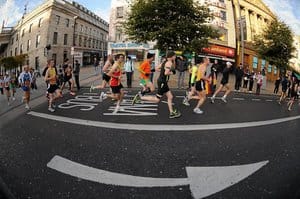The Dublin Marathon is fast approaching and I’ll bet you are getting a bit anxious at this stage. The good news is if you have been practicing your fueling up strategies in your long runs you don’t need to worry about ‘hitting the wall’. There is no denying that the 26.2 miles is a challenge but optimal fueling will make a huge difference to your ability to finish the marathon but also enjoy it!
The Last Few Weeks Before a Marathon:
It is important to remember that the food eaten throughout the weeks and months during your training is just as important as the food consumed just before the marathon.
Fuel up.
Carbohydrates are the most important energy source to support your training and marathon performance. Stores are limited in the body so regular replenishment is essential. Base all your meals on wholegrain carbohydrate rich foods such as wholegrain breakfast cereals, porridge oats, wholegrain bread, pasta, rice, potatoes, fruit and vegetables.
Get your 5-a-day!
As well as containing essential vitamins and minerals, fruit and sources of antioxidants such as vitamin C, beta carotene, vitamin E, zinc and selenium. Antioxidants benefit the body by mopping up damaging free radicals, which can help improve recovery after training. Different coloured fruits and vegetables provide different nutrients so aim for a rainbow of colours to get all the benefits.
Hydration
Stay hydrated by drinking plenty of fluid throughout the day as well as before, during and after your training. Remember that during training you will lose fluid through sweating. Unless those fluid losses are replaced you run the risk of becoming dehydrated which can cause early fatigue and impair your performance.
High Fibre
Avoid very high fibre sources of carbohydrates before your runs as these may cause stomach discomfort. More refined carbohydrate such as regular pasta, white rice and plain bagels are better before long runs. Although they are not as nutritious as wholegrain varieties they are easier on the stomach.
Fatty foods
Avoid high fat foods before your runs as these take longer to digest and may make you feel uncomfortable during training.
Refuel and Recover
Aim to consume a carbohydrate and protein containing snack within 30 minutes of finishing training, and not later than 2 hours to refuel your glycogen stores and rebuild muscle protein. Start some of your long runs at the time you will be starting the marathon so that you can practice eating your planned pre-marathon breakfast.
Sports Gels/Drinks
Training is a good time to experiment with the type and timing of food you consume before running in order to avoid any digestive discomfort like stomach cramps, diarrhoea or wind. It is also the ideal time to practice using gels and sports drinks to find one that you can tolerate.
If you would like help with any aspect of your nutrition plan for sport please do not hesitate to contact us for an appointment or a free 15 minute dietary assessment with our registered dietitians.















